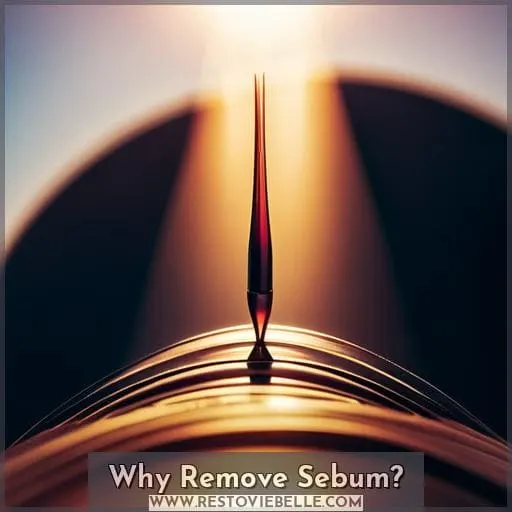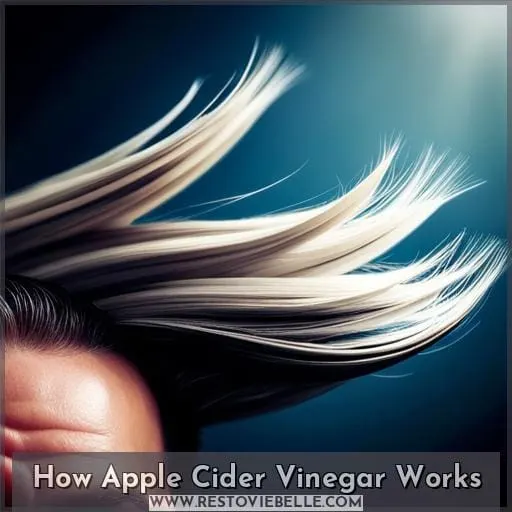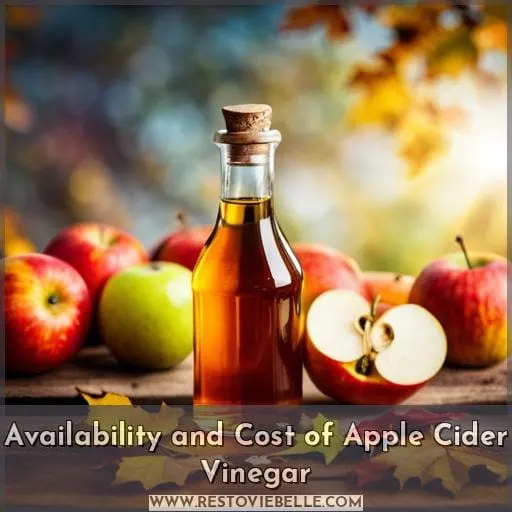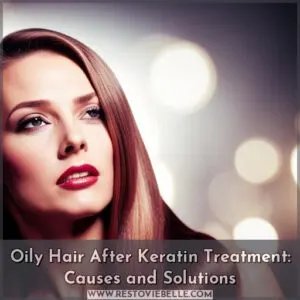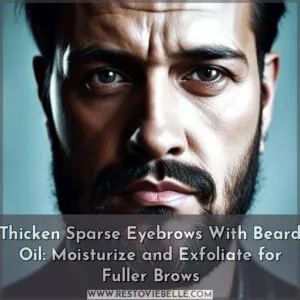This site is supported by our readers. We may earn a commission, at no cost to you, if you purchase through links.
 Do you ever find yourself feeling like your hair is weighed down with sebum build-up? And, if so, what can be done to remove it and keep it from happening again?
Do you ever find yourself feeling like your hair is weighed down with sebum build-up? And, if so, what can be done to remove it and keep it from happening again?
Apple Cider Vinegar (ACV) is a natural solution that has been known to work wonders in removing sebum. Sebum buildup on the scalp can cause irritation and lead to dandruff, acne, or even hair loss over time.
However, understanding why this occurs, as well as the benefits of using ACV for treatment, will help you restore balance and keep your scalp healthy.
In this article, we explore how ACV works, its availability, cost-effectiveness, potential downsides, and recipes for use at home – all while learning how best to put an end once and for all to sebum production with apple cider vinegar!
Table Of Contents
- Why Remove Sebum?
- Causes of Sebum Build-up
- Symptoms of Sebum Build-up
- How Apple Cider Vinegar Works
- Apple Cider Vinegar for Hair Loss
- Availability and Cost of Apple Cider Vinegar
- How to Choose the Best Apple Cider Vinegar
- Potential Downsides of Apple Cider Vinegar Use
- Frequently Asked Questions (FAQs)
- Conclusion
Why Remove Sebum?
Removing sebum from your scalp is essential for maintaining healthy, shiny hair and preventing irritation, odor, and product buildup. Apple Cider Vinegar (ACV) can be used to break down the oil buildup that clogs pores on the scalp.
A weekly ACV treatment helps prevent sebum accumulation by keeping your hygiene routine in check. It aids in cleansing away dirt and debris while restoring the pH balance of both hair strands and scalp.
To combat excessive production of this waxy substance, you can also try using baking soda as an alternative exfoliant when washing your hair or fading hair color with a milder option than ACV if needed.
ACV works wonders at relieving itchiness caused by excess sebum too! Simply apply it directly to dry roots with a spray bottle before shampooing or mix it into water for shower use after massaging it onto the scalp.
Causes of Sebum Build-up
Sebum buildup can be caused by a variety of factors, including time, hair care products, and overactive sebaceous glands. This accumulation often leads to an oily scalp that feels greasy or heavy, as well as unpleasant smells – all of which apple cider vinegar (ACV) can help remedy.
Time
Time can be a major factor in the build-up of sebum on your scalp and hair, so regular maintenance is key. Haircare products, overactive sebaceous glands, or even hyperseborrhea can cause excess grease and oil levels to accumulate, resulting in visible signs of oily roots and dandruff.
Apple cider vinegar helps remove this buildup with its antifungal/antibacterial properties. It can be applied through either an ACV rinse or spray during showering. This will help restore balance to your scalp’s pH level while promoting healthy hair growth without drying out strands too much.
Haircare Products
Haircare products can be like a clog in a drain, making it difficult for your scalp to breathe and leading to sebum buildup. Hair coloring, especially when done at home with boxed dyes, can throw off the pH balance of your hair, which leads to excess oils that are hard for soap alone to remove.
Using an ACV-infused scalp scrub or deep conditioning hair masque can help break down these tough deposits while nourishing and promoting healthy growth.
Regular use of such treatments alongside proper washing will keep oil levels balanced without exacerbating oily locks or contributing more build-up over time. Both of these issues can cause potential problems with hair loss and further buildup, respectively.
Overactive Sebaceous Glands
An overactive sebaceous gland can be a major contributor to sebum buildup, leaving you with an oily scalp and dull locks. The excess secretion of this natural oil may result from hormones or an improper haircare routine.
Treatment options range from medication prescribed by a doctor to natural remedies like warm water washes and apple cider vinegar rinses. However, caution should be taken when using the latter due to its acidic nature, which could disturb scalp health if used too often or in high concentrations.
Regularly monitoring your production levels is key, as well as replenishing moisture lost during treatments such as ACV rinses, for optimal long-term results without damaging hair strands further down the line!
Symptoms of Sebum Build-up
If you feel like your hair is heavy, greasy, or oily to the touch, it could be a sign of sebum buildup. Symptoms of this buildup include an unpleasant odor, an irritated scalp, and overly greasy and oily hair.
Apple cider vinegar can help restore balance and remove excess oil from the scalp.
Odor
One of the most tell-tale signs of sebum buildup is an unpleasant, pungent odor that can linger in your hair and make it difficult to feel clean. Apple cider vinegar (ACV) is a natural remedy for excess sebum due to its antifungal and antibacterial properties.
The acidity breaks down stubborn oil while restoring pH balance, which also helps with dandruff prevention. Lemongrass essential oil may be used instead as it has similar cleansing effects without affecting hair color or smell negatively.
For optimal scalp washing results, use ACV once weekly or adjust based on hydration levels. Oily hair may need twice-weekly treatments while dehydrated strands benefit from less frequent applications.
Alternatives such as baking soda should only be used cautiously since they can disrupt the scalp’s pH balance. If ACV doesn’t work, consult a doctor for underlying issues like free radicals or hormone imbalances that could cause excessive oil production in some cases.
Irritated Scalp
Sebum buildup can cause an itchy, uncomfortable scalp. Dry hair, brittle hair, and increased sebum production are all common symptoms of excessive accumulation.
To combat this issue using natural ingredients:
- Wash your hair regularly with mild shampoo and conditioner to prevent further buildup of oil.
- Replace regular shampoo with baking soda once a week for a deep cleanse without stripping the scalp’s natural oils.
- Consult a medical doctor or healthcare provider if store-bought products fail to solve the problem, as underlying issues such as DHT may be present. Hair loss can also occur due to bacteria and yeast on the scalp; ACV helps remove them while restoring balance in pH levels. Seek professional advice before taking any action, though – vinegar alone is not enough!
Oily and Greasy Hair
If your hair’s been feeling greasy and oily, it may be due to sebum buildup. Sebum is produced by sebaceous glands in the scalp, which can become overactive or blocked with product buildup. As a result of this blockage, oil accumulates on the scalp, resulting in an unhealthy appearance.
To combat this problem, apple cider vinegar helps remove excess oils from the scalp while balancing pH levels and preventing skin infections caused by bacteria or fungi growths. It also increases blood circulation for healthier strands and fades any existing hair color without stripping natural oils away from dry scalps.
A deep cleaning solution like ACV is best used as part of a 3-step system. This includes an ACV scrub shampoo followed up with rinse and masque treatments available commercially.
How Apple Cider Vinegar Works
You can harness the healing power of Apple Cider Vinegar to cleanse and nourish your scalp, as its antibacterial and antifungal properties make it an effective agent against excess sebum buildup. ACV helps remove sebum due to its cleansing properties—the acidity of apple cider vinegar breaks down stubborn oil.
It is also beneficial for fading hair color and soothing itchy scalp. There are two methods you can use this miracle elixir: in the shower or as a spray solution. In the shower, mix vinegar with water, massage into your roots, then rinse off with shampoo and conditioner afterwards.
Alternatively, saturate roots with ACV solution before washing out after 5-10 minutes.
Prevention involves proper hair washing plus intermittent ACV use, while moderation is key to avoiding dryness or brittle hair caused by excessive usage thereof. Baking soda may be used instead, but again must be done cautiously due to pH balance issues! Commercial scalp shampoos provide another option if DIY isn’t preferred, but consider getting unfiltered ‘mother’ when purchasing for maximum benefits from a cost perspective too compared to other variants available on the market today.
Incorporating ACV into the diet via recipes/drinks provides additional health benefits, which makes incorporating it part of the overall haircare routine a very popular choice today.
Apple Cider Vinegar for Hair Loss
You may have heard of apple cider vinegar for hair loss, but do you know why it is so effective? Apple cider vinegar helps remove buildup from the scalp and improves blood circulation to hair follicles.
It can also treat and prevent dandruff while preventing the growth of bacteria and yeast. Additionally, ACV targets free radicals, which reverses signs of aging in your hair, making this a great natural remedy for those looking to restore their locks naturally.
Removes Buildup From the Scalp
Apple cider vinegar is an effective cleanser, helping to remove product buildup from the scalp and restore its natural pH balance.
Regular shampooing can help prevent sebum buildup, but clarifying rinses like ACV are great for giving hair a deep cleanse and shine boost. Adding it into your haircare routine will improve the health of your scalp’s glands by balancing out its pH levels while also tightening strands for added volume.
Dry shampoos are useful when preventing buildup, but they don’t always reach deeper than the surface level. Exfoliating with a scalp scrub or using a regular rinse with diluted ACV is necessary every so often in order to keep oily skin at bay.
Improves Blood Circulation to Hair Follicles
By massaging apple cider vinegar into your scalp, it can help improve blood circulation to hair follicles. ACV helps balance the pH of the scalp and promotes healthy blood flow for a healthier, stronger head of hair.
This is important in order to reduce or prevent hair loss due to poor diet or lack of proper care.
In addition, regular use of ACV can be used as part of an overall healthy haircare routine. It helps remove buildup from sebum and promotes better nutrient absorption through improved circulation.
Finally, incorporating apple cider vinegar into your diet may also help increase nutrients that promote strong and healthy hair growth. This includes vitamins B & C and niacin-rich foods like eggs, nuts, and fish oil supplements.
Treats and Prevents Dandruff
With anti-fungal and antibacterial properties, ACV can help you combat dandruff effectively. It’s estimated that up to 50% of people suffering from dandruff will see improvement after regular use.
Causes of the condition include overactive sebaceous glands, haircare products, time, and scalp pH imbalance. To prevent dryness, moderate ACV usage; its rich nutrients remove buildup while protecting natural oils.
When applied to a flaky scalp, it helps relieve itching caused by pityriasis steatoides or seborrheic dermatitis due to its acidity balancing properties against bacteria and fungus growth.
In addition to cleansing the hair follicles with vinegar moderation for optimal results, shampooing regularly is key in preventing further build-up!
Prevents the Growth of Bacteria and Yeast
You can help protect your scalp and hair from bacteria and yeast with ACV, as it has natural antibacterial properties. This may reduce scalp irritation caused by the organisms, in addition to reducing odor associated with dirty hair.
To do this, use a mild shampoo or one containing natural ingredients like aloe vera to cleanse the scalp before applying diluted ACV rinse (three parts water and one part vinegar). Regular use of this treatment may also be beneficial for those suffering from neurological disorders such as Androgenetic Alopecia or metabolic disorders that cause digestive problems resulting in unhealthy hair growth.
Rinse thoroughly after application of the ACV solution for maximum benefit without drying out your strands!
Targets Free Radicals and Reverses Signs of Aging
Apple cider vinegar can help reverse signs of aging by targeting free radicals, leaving you with a more youthful look. Its vitamin C content protects skin cells from environmental damage that leads to wrinkles and age spots.
ACV also helps keep the pH balance in check, preventing hair loss and other complications. When used as a hair rinse, it has cleansing properties that help remove dirt build-up while restoring color vibrancy and softening split ends.
While ACV is beneficial for anti-aging purposes, its use should be moderated to reduce any potential drying out of the scalp or overproduction of sebum on oily scalps.
Availability and Cost of Apple Cider Vinegar
Cost-effective and widely available, ACV is a great option for those looking to improve the health of their hair. When comparing prices, organic options may be more expensive, but they provide therapeutic benefits such as increased scalp hydration and reduced itchiness.
Homemade recipes using ACV can also be used, which are cheaper than store-bought products.
Topically applied with diluted solutions or sprays, apple cider vinegar helps remove sebum buildup that causes dryness, flaking scalps, and poor hygiene practices leading to greasy patches on the scalp or brittle strands of hair.
For maximum benefit when using ACV, it’s important to find the right balance in frequency depending on your type of hair.
Alternatives like shampoo specifically designed for sebum removal are available too, but Apple Cider Vinegar remains one of the best natural remedies out there due to its cost-effectiveness and wide availability, making it an ideal choice for many people looking after their tresses naturally.
How to Choose the Best Apple Cider Vinegar
Choosing the best apple cider vinegar can be a daunting task, but it’s worth taking the time to make sure you are getting a high-quality product. Add ACV to your diet by incorporating it into recipes and drinks, use it as a hair rinse for cleansing and nourishment, or take it as an easy supplement in pill form.
No matter which option you choose, make sure you look for one with the mother included for maximum benefits of this natural health supplement.
Add It to Your Diet
Adding apple cider vinegar to your diet can help reduce sebum buildup, improve blood circulation, and provide essential vitamins and minerals for healthy hair growth. It’s vegan-friendly, too! ACV benefits range from natural remedies like scalp treatments or home remedies for waxy feeling scalps to more intensive hair treatments such as diluted mixtures that are applied directly onto the scalp.
Redness on the scalp may be reduced by using this method of application in addition to drinking a glass of diluted ACV each day.
Use It as a Hair Rinse
For a clean and shiny scalp, use ACV as a weekly hair rinse to remove buildup from your strands and nourish the scalp. This gentle cleansing process also helps restore balance to the pH level of your skin while helping reduce irritated scalps due to product buildup or too much sebum.
Additionally, this natural remedy can help relieve oily and greasy hair by breaking down stubborn oil that’s been sitting on your head for days.
With regular use of Apple Cider Vinegar treatments, not only will you experience beautiful results, but it’s also beneficial in promoting overall healthy growth!
Take It as a Supplement
You can reap the benefits of ACV without sacrificing time or money by taking it as a supplement. Studies have shown that consuming apple cider vinegar pills daily reduces sebum production in the scalp by up to 40%.
Natural supplements with ACV are an excellent choice for those looking to restore pH balance and hair health.
Commercial products such as R+Co Acid Wash and dpHUE 3-step system offer DIY treatments, while scalp shampoos provide more convenient options if needed. Apple cider vinegar helps reduce itchiness, crusty skin, and secondary bacterial infections related to sebum buildup, as well as fading hair color.
While alternative ingredients like baking soda should be used with caution due to their potential effect on pH balance, moderation is key when using ACV supplements.
Potential Downsides of Apple Cider Vinegar Use
Though ACV can help with sebum buildup, overuse may lead to dry and brittle hair, as well as increased sebum production. Going overboard on the vinegar-based treatments can cause scalp irritation due to its acidic properties.
Free radicals are also removed from the scalp when using ACV; however, this could result in excessive dryness if used too frequently or applied without taking proper precautions such as diluting it with water first.
With that being said, there is an optimal frequency for use of ACV based on your individual hair type – oily hair might benefit from twice weekly treatments whereas extremely dehydrated strands should only be treated once every other week at most.
If you find yourself needing more frequent applications than what is recommended here, then try switching up to a different method of cleansing instead such as baking soda or commercial shampoo products tailored towards removing excess oil without causing undue damage and dehydration to the strand structure itself.
Moderation is key when trying out new natural remedies like apple cider vinegar, so make sure not to go overboard!
Frequently Asked Questions (FAQs)
What is the best way to use apple cider vinegar on the hair?
To use ACV on hair, mix water, aloe vera, and ACV in a bottle. Massage into the scalp, then apply to mid-lengths and ends. Leave for up to five minutes before rinsing thoroughly with conditioner. Use weekly or based on hydration levels – too often can dry out hair, while infrequent use won’t remove buildup properly.
Is apple cider vinegar safe to use on color-treated hair?
Yes, apple cider vinegar is generally safe to use on color-treated hair as it helps remove buildup and nourish the scalp without stripping natural oils. However, its acidity can fade some dyes, so using diluted ACV and avoiding frequent treatments is key for preserving hair color.
Are there any alternatives to apple cider vinegar for removing sebum?
Yes, there are other options for removing sebum. Try a scalp shampoo or a baking soda solution, but be mindful of the pH balance. Alternatively, choose commercially available products like R+Co Acid Wash and dpHUE 3-step system to gently cleanse your hair without stripping natural oils.
How often should apple cider vinegar be used on the scalp?
Frequency of ACV treatments depends on the condition of your hair. Aim for once a week, but adjust based on hydration levels: dehydrated hair can benefit from biweekly treatments while oily hair may require twice-weekly use.
Does apple cider vinegar help with hair regrowth?
Yes, apple cider vinegar can help with hair regrowth. Its antibacterial and antifungal properties help remove sebum buildup from the scalp, improving blood circulation to the follicles while also nourishing it.
Conclusion
The use of apple cider vinegar to remove sebum has been around for centuries, and with good reason. ACV is packed with beneficial minerals and nutrients, including vitamins B and C, and niacin. It works as an antifungal and antibacterial agent, breaking down stubborn oil and preventing the growth of bacteria and yeast.
ACV can also help with hair loss by removing buildup from the scalp and improving blood circulation to follicles. While it is widely available and affordable, moderation is key to prevent drying out the scalp.
To fully address hair loss, the underlying cause must be addressed and ACV is not a substitute for proper showering.
With all of these benefits, it’s no wonder that ACV has become a favorite among the health and wellness community. So, if you’re looking to battle sebum buildup and get the most out of your hair care routine, give apple cider vinegar a try.

